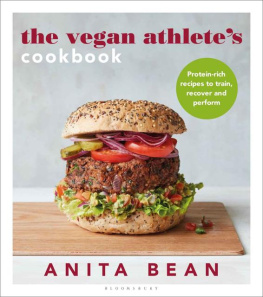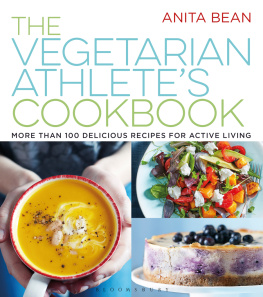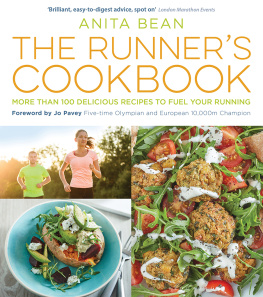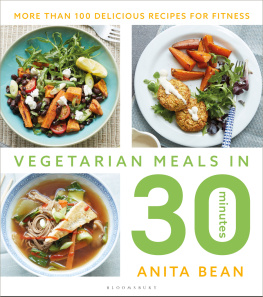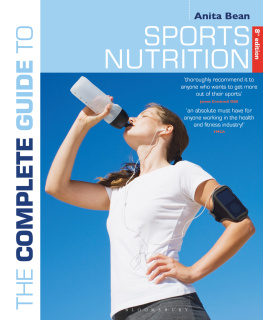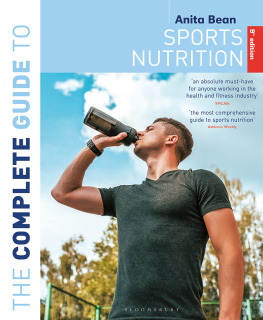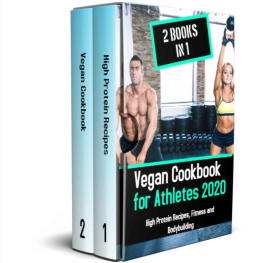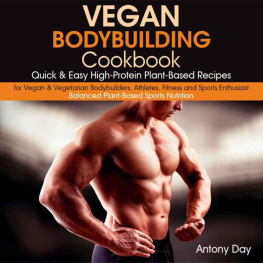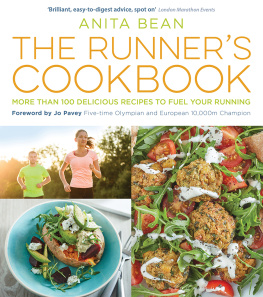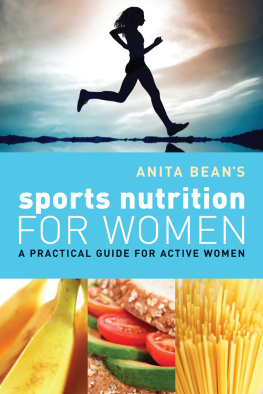Anita Bean - The Vegan Athletes Cookbook
Here you can read online Anita Bean - The Vegan Athletes Cookbook full text of the book (entire story) in english for free. Download pdf and epub, get meaning, cover and reviews about this ebook. year: 2021, publisher: Bloomsbury Publishing, genre: Children. Description of the work, (preface) as well as reviews are available. Best literature library LitArk.com created for fans of good reading and offers a wide selection of genres:
Romance novel
Science fiction
Adventure
Detective
Science
History
Home and family
Prose
Art
Politics
Computer
Non-fiction
Religion
Business
Children
Humor
Choose a favorite category and find really read worthwhile books. Enjoy immersion in the world of imagination, feel the emotions of the characters or learn something new for yourself, make an fascinating discovery.
- Book:The Vegan Athletes Cookbook
- Author:
- Publisher:Bloomsbury Publishing
- Genre:
- Year:2021
- Rating:3 / 5
- Favourites:Add to favourites
- Your mark:
- 60
- 1
- 2
- 3
- 4
- 5
The Vegan Athletes Cookbook: summary, description and annotation
We offer to read an annotation, description, summary or preface (depends on what the author of the book "The Vegan Athletes Cookbook" wrote himself). If you haven't found the necessary information about the book — write in the comments, we will try to find it.
The Vegan Athletes Cookbook — read online for free the complete book (whole text) full work
Below is the text of the book, divided by pages. System saving the place of the last page read, allows you to conveniently read the book "The Vegan Athletes Cookbook" online for free, without having to search again every time where you left off. Put a bookmark, and you can go to the page where you finished reading at any time.
Font size:
Interval:
Bookmark:

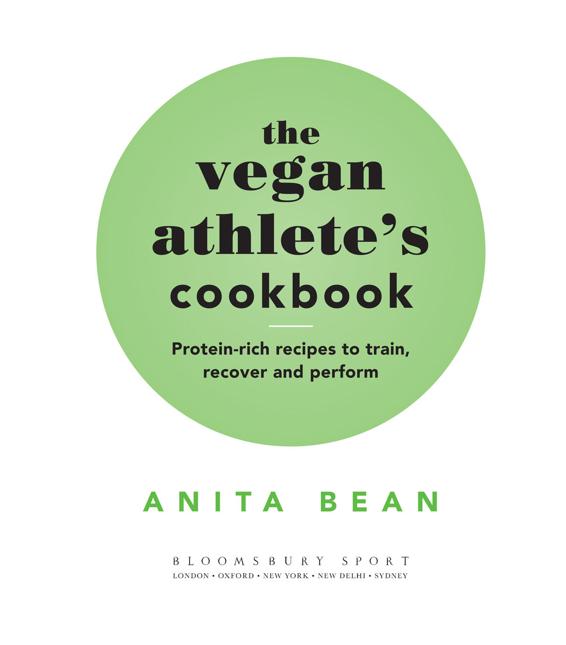
Contents
Health, performance and the environment
How to build a balanced vegan sports diet
All you need to know
What to eat and drink before, during and after exercise
and supplements
Welcome to my fourth sports nutrition cookbook, in which I aim to show you how incredibly tasty and nutritious vegan cooking can be.
Writing a solely vegan book for athletes has been a dream of mine since I wrote The Vegetarian Athletes Cookbook (Bloomsbury Sport, 2016). Many of you have told me how much you enjoyed the vegan recipes and it is clear that more and more of you are adopting increasingly meat- and dairy-free diets. So, I have created a brand-new collection of delicious vegan recipes, which are packed with all the nutrients you need to train, perform and recover. In addition, this book provides evidence-based advice on how to optimise your performance on a vegan diet. It features my Vegan Athletes Plate, an easy tool to help you build a balanced diet and fuel your workouts on easy, moderate and hard training days.
Until relatively recently, veganism was considered faddy, unhealthy and restrictive. It certainly held little appeal for athletes who had long believed that animal products were essential for athletic performance. Certainly, when I was competing as a vegetarian bodybuilder in the nineties, the idea that you could compete successfully without eating meat was unheard of. I was always asked where I was getting my protein from, which is understandable as meat has long been synonymous with strength. Nonetheless, I managed to prove the doubters wrong when I won the British Bodybuilding Championships and finished in the top 10 at the World Championships. I retired from competition but have maintained a daily exercise habit either with weight training, road cycling, yoga, running or hiking.
Thankfully, attitudes have changed since the nineties and I have seen a huge rise in interest in vegan diets among athletes in my practice including male athletes which is a big departure from the social stereotype of a meat-eating athlete. Much of this interest in vegan diets has been fuelled by a shifting awareness of the health, performance and environmental impacts of a vegan diet (which are covered in ).
WHAT IS A VEGAN DIET?
A vegan diet is one that excludes all animal products, including meat, fish, poultry, dairy products, eggs and honey. Most vegans also avoid wearing animal-derived materials such as fur, leather, silk and wool and using household products and cosmetics containing animal-derived ingredients. The Vegan Society defines veganism as a way of living which seeks to exclude, as far as is possible and practicable, all forms of exploitation of, and cruelty to, animals for food, clothing or any other purpose. You may have heard the term plant-based, which is sometimes used interchangeably with vegan but sometimes with a vegetarian, pescatarian (includes fish), or flexitarian diet that still includes small amounts of animal products. In fact, there is no universally agreed definition of the term, which in my view renders it rather meaningless. So, I have used the term vegan throughout this book.
Many people, including myself, love animals and dont want to see them suffer, so choosing a more ethical and compassionate way of eating makes perfect sense. Additionally, vegan campaigns such as Veganuary and Netflix documentaries, such as The Game Changers, have helped to get a powerful message out there: that you dont need to eat animal products to perform well in sport. As a result, an increasing number of world-class athletes from many different sports, including ultra-endurance and endurance, strength, power and team sports, have switched to a vegan diet.
Outside the world of sport, vegan diets have also grown in popularity. The number of vegans in the UK has quadrupled between 2014 and 2019 to more than 600,000, a number thats likely to grow substantially in the coming years. It is clear that veganism is on the rise.
Veganism does not have to be all or nothing, though. Simply going vegan one day a week or substituting more vegan meals for meat in your weekday or weekend routine is a great place to start and means you will be getting more plant nutrients that will protect against chronic lifestyle-related illnesses, support your athletic performance and promote recovery. You can be a part-time vegan if you want and then decide whether you adopt this way of eating long-term.
What makes this book different from other vegan cookbooks is its focus on performance. Every recipe has been created to provide a high level of nutrients that will fuel your workouts and promote recovery. Uniquely, all the main meal recipes in this book supply at least 20 g protein per serving, which is the optimal amount needed for muscle recovery.
What else can you expect in this book? In , which highlights the health, performance and environmental advantages of this way of eating. All of this information is backed up by published studies and I have provided references at the end of the book so that you can read more about them.
While a well-planned vegan diet can be an extremely healthy way of eating, I am also aware that some people look to veganism as a way of losing weight. For non-athletes, this can be an effective strategy, but if you exercise regularly then you do need to ensure you eat enough to fuel your training without compromising your health. An overly restricted vegan diet can quickly result in energy deficiency, health problems and reduced performance. In , I flag up the early warning signs to watch out for and explain how you can ensure you avoid these pitfalls.
Of course, having the freedom to choose to eat a varied and healthy diet is a privilege. And while we are free to choose to eat a vegan diet, we should not cast judgement on other peoples food choices nor allow our dietary beliefs to set us apart from other people. Everyone is entitled to choose a diet that best fits their ethics, philosophy, tastes, special dietary requirements and finances.
I am a strong believer that vegan food should not be boring and in this book I hope to prove that it can be exciting and incredibly tasty. Eating is one of lifes great pleasures and we should never feel guilty for enjoying our food or spending time, money and effort in attaining it. I love making and eating vegan food and I hope that the recipes in this book will inspire you to develop a passion for vegan food, too.
Enjoy!


PART
Vegan sports nutrition
Although vegan diets have come a long way in last few years, there remain many myths and misconceptions surrounding them, particularly when it comes to athletic performance. Naysayers are always quick to cite a story of someone who became unwell on a vegan diet before switching back to eating animal products. But this is not a valid argument against vegan diets.
Such anecdotes are invariably devoid of context or nuance. If you cut out animal products without replacing them with suitable alternatives or adopt a poorly planned vegan diet with the sole aim of weight loss, then you will likely develop health problems. But you cannot say that all vegan diets are harmful or that animal products are necessary for health.
Font size:
Interval:
Bookmark:
Similar books «The Vegan Athletes Cookbook»
Look at similar books to The Vegan Athletes Cookbook. We have selected literature similar in name and meaning in the hope of providing readers with more options to find new, interesting, not yet read works.
Discussion, reviews of the book The Vegan Athletes Cookbook and just readers' own opinions. Leave your comments, write what you think about the work, its meaning or the main characters. Specify what exactly you liked and what you didn't like, and why you think so.

